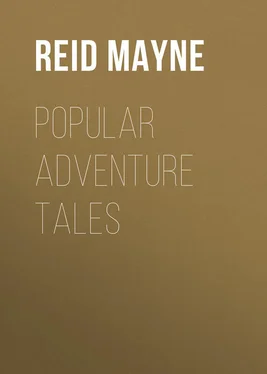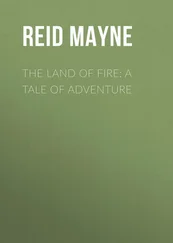Mayne Reid - Popular Adventure Tales
Здесь есть возможность читать онлайн «Mayne Reid - Popular Adventure Tales» — ознакомительный отрывок электронной книги совершенно бесплатно, а после прочтения отрывка купить полную версию. В некоторых случаях можно слушать аудио, скачать через торрент в формате fb2 и присутствует краткое содержание. Жанр: literature_19, foreign_antique, foreign_prose, foreign_children, на английском языке. Описание произведения, (предисловие) а так же отзывы посетителей доступны на портале библиотеки ЛибКат.
- Название:Popular Adventure Tales
- Автор:
- Жанр:
- Год:неизвестен
- ISBN:нет данных
- Рейтинг книги:3 / 5. Голосов: 1
-
Избранное:Добавить в избранное
- Отзывы:
-
Ваша оценка:
- 60
- 1
- 2
- 3
- 4
- 5
Popular Adventure Tales: краткое содержание, описание и аннотация
Предлагаем к чтению аннотацию, описание, краткое содержание или предисловие (зависит от того, что написал сам автор книги «Popular Adventure Tales»). Если вы не нашли необходимую информацию о книге — напишите в комментариях, мы постараемся отыскать её.
Popular Adventure Tales — читать онлайн ознакомительный отрывок
Ниже представлен текст книги, разбитый по страницам. Система сохранения места последней прочитанной страницы, позволяет с удобством читать онлайн бесплатно книгу «Popular Adventure Tales», без необходимости каждый раз заново искать на чём Вы остановились. Поставьте закладку, и сможете в любой момент перейти на страницу, на которой закончили чтение.
Интервал:
Закладка:
“Now,” remarked François, “if we only had a cup of coffee and a glass of wine, we might say that we had dined in fashionable style.”
“I think,” replied Lucien, “we are better without the wine, and as for the other I cannot give you that, but I fancy I can provide you with a cup of tea if you only allow me a little time.”
“Tea!” screamed François; “why, there's not a leaf of tea nearer than China; and for the sugar, not a grain within hundreds of miles!”
“Come, Frank,” said Lucien, “nature has not been so ungenerous here, even in such luxuries as tea and sugar. Look yonder! You see those large trees with the dark-coloured trunks. What are they?”
“Sugar-maples,” replied François.
“Well,” said Lucien, “I think even at this late season we might contrive to extract sap enough from them to sweeten a cup of tea. You may try, while I go in search of the tea-plant.”
“Upon my word, Luce, you are equal to a wholesale grocery. Very well. Come, Basil, we'll tap the maples; let the captain go with Luce.”
The boys, separating into pairs, walked off, in different directions. Lucien and his companion soon lighted upon the object of their search in the same wet bottom where they had procured the Heracleum . It was a branching shrub, not over two feet in height, with small leaves of a deep green colour above, but whitish and woolly underneath. It is a plant well known throughout most of the Hudson's Bay territory by the name of “Labrador tea-plant;” and is so called because the Canadian voyageurs, and other travellers through these northern districts, often drink it as tea. It is one of the Ericaceæ , or heath tribe, of the genus Ledum – though it is not a true heath, as, strange to say, no true heath is found upon the continent of America.
There are two kinds of it known, – the “narrow-leafed” and “broad-leafed” and the former makes the best tea. But the pretty white flowers of the plant are better for the purpose than the leaves of either variety; and these it was that were now gathered by Lucien and Norman. They require to be dried before the decoction is made; but this can be done in a short time over a fire; and so in a short time it was done, Norman having parched them upon heated stones.
Meanwhile Basil and François had obtained the sugar-water, and Lucien having washed his soup-kettle clean, and once more made his boiling stones red-hot, prepared the beverage; and then it was served out in the tin cup, and all partook of it. Norman had drunk the Labrador tea before, and was rather fond of it, but his Southern cousins did not much relish it. Its peculiar flavour, which somewhat resembles rhubarb, was not at all to the liking of François. All, however, admitted that it produced a cheering effect upon their spirits; and, after drinking it, they felt in that peculiarly happy state of mind which one experiences after a cup of the real “Bohea.”
CHAPTER XVI.
THE MARMOTS OF AMERICA
From such a luxurious dinner you may suppose that our young voyageurs lived in prime style. But it was not always so. They had their fasts as well as feasts. Sometimes for days they had nothing to eat but the jerked deer-meat. No bread – no beer – no coffee, nothing but water – dry venison and water. Of course, this is food enough for a hungry man; but it can hardly be called luxurious living. Now and then a wild duck, or a goose, or perhaps a young swan, was shot; and this change in their diet was very agreeable. Fish were caught only upon occasions, for often these capricious creatures refused François' bait, however temptingly offered.
After three weeks' coasting the Lake, they reached the Saskatchewan, and turning up that stream, now travelled in a due westerly direction. At the Grand Rapids, near the mouth of this river, they were obliged to make a portage of no less than three miles, but the magnificent view of these “Rapids” fully repaid them for the toil they underwent in passing them.
The Saskatchewan is one of the largest rivers in America, being full 1600 miles in length, from its source in the Rocky Mountains to its débouchure , under the name of the “Nelson River,” in Hudson's Bay. For some distance above Lake Winnipeg, the country upon its banks is well wooded. Farther up, the river runs through dry sandy prairies that extend westward to the foot-hills of the Rocky Mountains. Many of these prairies may be properly called “deserts.” They contain lakes as salt as the ocean itself, and vast tracts – hundreds of square miles in extent – where not a drop of water is to be met with. But the route of our voyageurs did not lie over these prairies. It was their intention, after reaching Cumberland House, to turn again in a northerly direction.
One evening, when within two days' journey of the Fort, they had encamped upon the bank of the Saskatchewan. They had chosen a beautiful spot for their camp, where the country, swelling into rounded hills, was prettily interspersed with bushy copses of Amelanchiers , and Rosa blanda whose pale red flowers were conspicuous among the green leaves, and filled the air with a sweet fragrance, that was wafted to our voyageurs upon the sunny breeze. The ground was covered with a grassy sward enamelled by the pink flowers of the Cleome , and the deeper red blossoms of the beautiful wind-flower.
Upon that day our travellers had not succeeded in killing any game, and their dinner was likely to consist of nothing better than dry venison scorched over the coals. As they had been travelling all the morning against a sharp current, and, of course, had taken turn about at the paddles, they all felt fatigued, and none of them was inclined to go in search of game. They had flung themselves down around the fire, and were waiting until the venison should be broiled for dinner.
The camp had been placed at the foot of a tolerably steep hill, that rose near the banks of the river. There was another and higher hill facing it, the whole front of which could be seen by our travellers as they sat around their fire. While glancing their eyes along its declivity, they noticed a number of small protuberances or mounds standing within a few feet of each other. Each of them was about a foot in height, and of the form of a truncated cone – that is, a cone with its top cut off, or beaten down.
“What are they?” inquired François.
“I fancy,” answered Lucien, “they are marmot-houses.”
“They are,” affirmed Norman; “there are plenty of them in this country.”
“Oh! marmots!” said François. “Prairie-dogs, you mean? – the same we met with on the Southern prairies?”
“I think not,” replied Norman: “I think the prairie-dogs are a different sort. Are they not, cousin Luce?”
“Yes, yes,” answered the naturalist; “these must be a different species. There are too few of them to be the houses of prairie-dogs. The 'dogs' live in large settlements, many hundreds of them in one place; besides, their domes are somewhat different in appearance from these. The mounds of the prairie-dogs have a hole in the top or on one side. These, you see, have not. The hole is in the ground beside them, and the hill is in front, made by the earth taken out of the burrow, just as you have seen it at the entrance of a rat's hole. They are marmots, I have no doubt, but of a different species from the prairie-dog marmots.”
“Are there not many kinds of marmots in America? I have heard so,” said François.
This question was of course addressed to Lucien.
“Yes,” answered he. “The fauna of North America is peculiarly rich in species of these singular animals. There are thirteen kinds of them, well known to naturalists; and there are even some varieties in these thirteen kinds that might almost be considered distinct species. I have no doubt, moreover, there are yet other species which have not been described. Perhaps, altogether, there are not less than twenty different kinds of marmots in North America. As only one or two species are found in the settled territories of the United States, it was supposed, until lately, that there were no others. Latterly the naturalists of North America have been very active in their researches, and no genus of animals has rewarded them so well as the marmots – unless, perhaps, it may be the squirrels. Almost every year a new species of one or the other of these has been found – mostly inhabiting the vast wilderness territories that lie between the Mississippi and the Pacific Ocean.
Читать дальшеИнтервал:
Закладка:
Похожие книги на «Popular Adventure Tales»
Представляем Вашему вниманию похожие книги на «Popular Adventure Tales» списком для выбора. Мы отобрали схожую по названию и смыслу литературу в надежде предоставить читателям больше вариантов отыскать новые, интересные, ещё непрочитанные произведения.
Обсуждение, отзывы о книге «Popular Adventure Tales» и просто собственные мнения читателей. Оставьте ваши комментарии, напишите, что Вы думаете о произведении, его смысле или главных героях. Укажите что конкретно понравилось, а что нет, и почему Вы так считаете.












